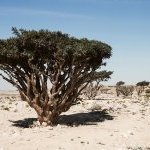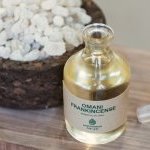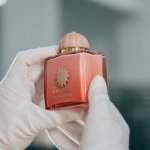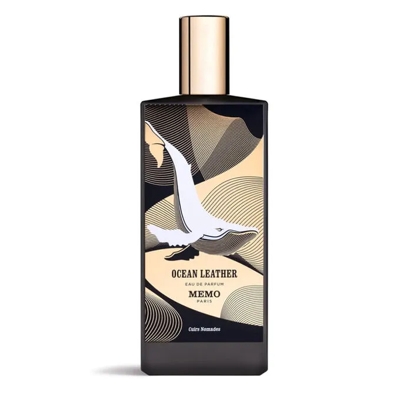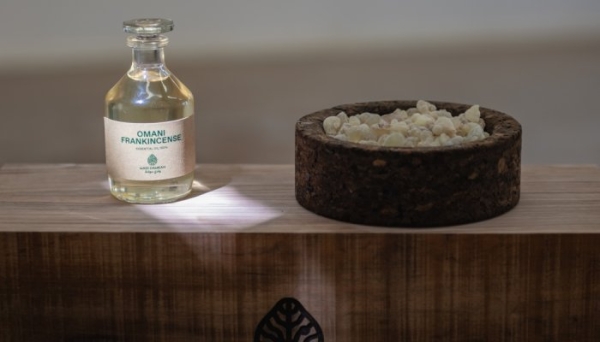
At the World Perfumery Congress 2024, Amouage unveiled a partnership with dsm-firmenich for producing incense essential oil from the Wadi Dawkah region, in the Sultanate of Oman. This initiative is fully in line with the perfume industry’s growing desire to highlight its historical and cultural heritage. We met Renaud Salmon, Chief Creative Officer of the brand.
Known and used since ancient times for its aromatic qualities, incense is inextricably linked to the history of perfumery and of the Near and Middle East civilisations. It is also a key ingredient in Amouage fragrances, in line with the growing interest in natural ingredients and traditional craftsmanship.
A heritage initiative
The adventure began in 2022, when Amouage joined forces with Oman’s Ministry of Heritage and Tourism to revive the incense industry in the sultanate. In the process, the brand also acquired land in the Wadi Dawkah region, a UNESCO World Heritage Site, to cultivate the trees that produce the precious resin.
Then, it surrounded itself with a number of partners: the Environment Society and the Oman Botanic Garden, as well as two experts in sustainable sourcing, perfumer Pierre Négrin and fragrance ingredient sourcing specialist Dominique Roques. For this project, Amouage also teamed up with dsm-firmenich, a perfume company renowned for its expertise in natural materials.
For Renaud Salmon, the Chief Creative Officer of Amouage, the fact that perfumers are involved in the project is a strength. “They are aware of what this new essence brings to the palette of ingredients,” he explains.
In fact, this Omani variety highlights the bursting, vertical, and vibrant quality of incense, with a sparkling effect reminiscent of citrus fruit or pink berries, to which it offers a real alternative, as it is also more persistent. Diluted to 10%, the essence also reveals aldehydic nuances.
Full traceability
Amouage mapped the trees to offer a traceable product. Each tree is listed, and its health condition is checked and accessible by scanning a QR code.
Incense from Wadi Dawkah is not only traceable, but also ethical, since it is harvested throughout the year, so local communities can make a sustainable living from this resource. Every three months, sap transformed into resin is collected from the trees. The incense “tears” are classified by colour and then distilled.
The first harvest took place between September 2023 and March 2024. “It helped us determine the most favourable times of year for picking. Plus, we identified the different qualities obtained depending on the harvesting area. It is a visual stage consisting in assessing the colour, size, and appearance before proceeding to analyse the components during distillation and the olfactory assessment,” explains Renaud Salmon.
The Wadi Dawkah incense essential oil showcased at the WPC comes from resins processed at the dsm-firmenich site in Grasse. Eventually, in order to obtain a short circuit, the resins will be distilled at the dsm-firmenich plant currently under construction in the region.
A reasonable cost
Another advantage is that the cost of this new essential oil remains reasonable. “It is great to use very expensive ingredients, but their quantity often turns out to be minute in a formula. What appeals to me here is to offer a traceable, ecoresponsible ingredient at a reasonable price. And therefore to create perfumes which contain pretty high quantities,” claims Renaud Salmon.
For now, Amouage reserves the exclusive use of this essential oil. However, it could eventually be marketed, though limits have yet to be defined. “It is important to find the right balance between quality and the right price for the ingredient. Our long-term vision is that of a material that will be self-regulating in terms of supply and demand, not to put too much pressure on the natural resource, while at the same time creating jobs in production sectors in Oman,” he adds.
Once its needs will have been met, the brand hopes to open up the surplus production to “beautiful companies, after a dialogue between creative people, suppliers, and perfumers, provided this variety of incense has a raison d’être within the compositions.”
With this partnership, dsm-firmenich is enriching its natural palette with a very high-quality incense essential oil, which can be used by perfumers of other brands with the agreement of Amouage.
“Few companies produce a material themselves and then open it up to other brands. It is a new vision in a way. It reflects our desire to enrich the market with quality creations and promote beautiful perfumery, while highlighting Oman’s heritage,” points out Renaud Salmon.
Although the term has become generic, incense (or olibanum) actually refers to a wide variety of resins secreted by the Boswellia trees, commonly cultivated in East Africa and the Arabian Peninsula, from Somalia to Yemen. As a matter of fact, the Wadi Dawkah site is home to the world’s largest protected forest of Boswellia sacra. Through this partnership, Amouage highlights this protected incense sanctuary, one of the four historic sites on the incense trade route – a way of reconnecting the age-old history of incense resin with the art of contemporary perfumery.
Portfolio

